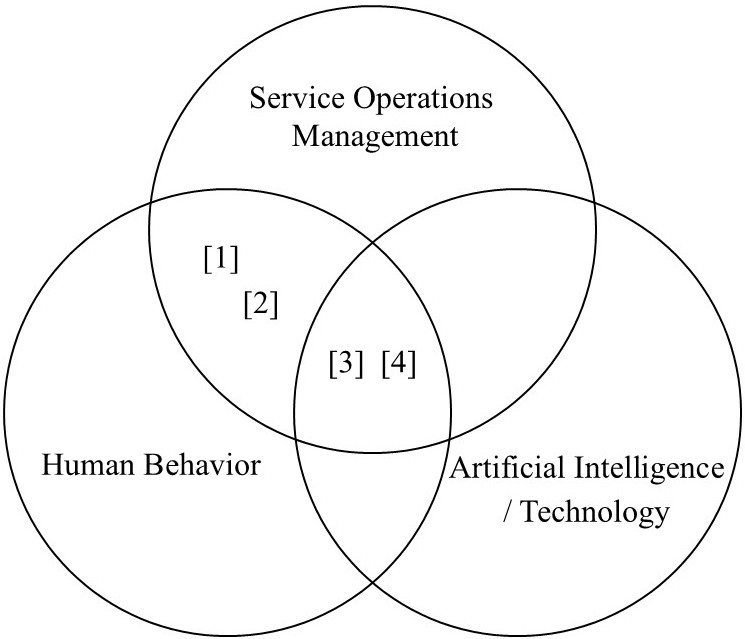Research

I use empirical methods to study human behavior and decision-making regarding the use of operational technologies in service settings, as visualized in the figure to the right. A better understanding of these aspects can increase service process efficiency, improve service quality, and help service organizations enhance human well-being. While my primary discipline is operations management, my research also draws inspiration and intelligence from other fields, including information systems, marketing, and psychology.
Papers under Review & Working Papers
- [1]: Chia-Chun Yang, Craig Froehle, Sachin Modi, Elizabeth Leenellett, “Effect of Shift Structure on Service-Worker Fatigue: Evidence from Emergency Department Caregivers” (planned for submission to Production and Operations Management in early 2026)
- Finalist, 2023 POMS College of Behavioral Operations Management Junior Scholar Paper Competition.
- It is well-established that worker fatigue can have deleterious consequences for work quality. However, less is known about how shift structure – an operational policy decision – influences worker fatigue. We collected primary data through a month-long fatigue-monitoring program we developed and implemented in an emergency department at a large, midwestern, academic hospital. Using a combination of nonparametric and econometrics models, we found that both the duration of a shift and its timing (i.e., when the shift starts) have important and differential impacts on workers’ perceived physical and mental fatigue. In addition, we observed that time spent on either extra-clinical professional responsibilities or personal chores reduces the efficacy of a clinician’s recovery time in terms of fatigue reduction. In contrast, we find that time spent with family and loved ones can significantly improve the effectiveness of fatigue recovery periods between work shifts. We conclude that scheduling policies that mitigate the physical and mental fatigue induced by shift work and allow for enhanced fatigue recovery between shifts should be preferred by organizations concerned with both employee well-being and consistently high service quality.
- [2]: Adam Arveson, Chia-Chun Yang, Craig Froehle, Liana Victorino, Mike Dixon, Matthew Walsman, “40 Years of ‘The Psychology of Waiting Lines’: A Celebration and Update of Maister’s 8 Propositions” (Major Revision at Production and Operations Management)
- Best Paper Award, 2025 QUIS19 Symposium.
- Waiting is a core element of customer experience and remains a key metric for service quality in operations management. Published in 1985, “The Psychology of Waiting Lines” by David Maister introduced eight propositions that have shaped the understanding of how customers perceive waiting time and have inspired both service academia and industry for decades. To celebrate the 40th anniversary of Maister’s work, our study revisits and evaluates Maister’s propositions and their citations, explores their relevancy for modern service contexts, and offers insights into the future of the psychology of waiting.
- [3]: Chia-Chun Yang, Craig Froehle, Yinghao Zhang, “The Influence of Task Complexity and Anthropomorphism on Customer Preference for AI Service Agents: A Trust and Risk Perspective” (in preparation for submission to Manufacturing & Service Operations Management)
- AI service agents, commonly referred to as “chatbots,” are evolving rapidly in service industries and represent a form of self-service technologies, where services are delivered without direct involvement of a service worker. Advancements in natural language processing models have equipped AI service agents to handle complex service tasks with empathy, responsiveness, and reliability that can sometimes surpass human agents. Despite the capabilities of AI service agents, customers’ perceptions and acceptance of these technologies remain ambiguous. Our study employs a combination of experimental and survey methods to investigate how task complexity and the anthropomorphism of AI service agents (i.e., their human-like realism) affect customers’ trust and risk perceptions regarding both the technology and the service delivery system overall. Understanding how these factors influence a customer’s behavior and decision-making can offer important managerial insights, enabling organizations to make better-informed decisions about technology resource investment and service system design, which could potentially enhance both operational and financial performance.
Ongoing Research
- [4]: Chia-Chun Yang, Yinghao Zhang, Craig Froehle, “Effect of Task and Temporal Attributes on Customers’ Decisions to Use Self-Service Technologies” (data collection/analysis in progress)
- Self-service technologies (SSTs) are being increasingly implemented across various service industries, including financial, retail, and healthcare. Early research highlighted the benefits of SSTs for service organizations, emphasizing cost reduction and productivity enhancement. Recent studies have shifted their focus toward understanding the factors that motivate customers’ decisions to use SSTs. These studies have primarily concentrated on the factors of customer characteristics (e.g., personality, technology attitude, self-efficacy, and prior experience) and system design (e.g., convenience, ease of use, controllability, flexibility, supportiveness, and enjoyment). However, there is still a lack of knowledge regarding situational factors that can influence customers’ decisions. Hence, our study focuses on two such factors: Task Complexity and Time Pressure. This leads to our research question: How do task complexity and time pressure influence customers’ preferences of using self-service technologies? To answer this question, we designed and conducted online experiments to observe people’s SSTs preferences under a simulated grocery checkout environment. This research method is novel compared to the previous literature, which typically relies on scenario-based surveys to examine people’s general perceptions and choices. Our study contributes to the existing literature by examining situational factors as determinants of customers’ decisions to use service technology; where knowing how such factors affect customers’ decisions is insightful for organizations to make better decisions about investing and allocating self-service technologies to improve operational and financial performances.
